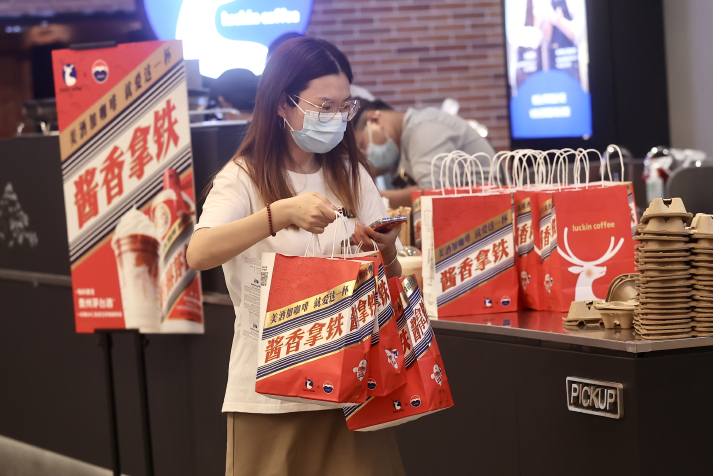Kweichow Moutai, a high-end liquor that is a staple of sumptuous Chinese banquets, may not necessarily be young peoples’ cup of tea, but it has recently found its way into their cups of coffee.
On September 4, domestic coffee chain Luckin Coffee and China’s top liquor maker Kweichow Moutai jointly launched a Moutai-flavored latte. The coffee drink is priced at 38 yuan ($5.2) per cup but consumers can currently buy it with coupons for 19 yuan ($2.6). Topics related to the drink have since been trending on Weibo, China’s popular micro-blogging platform. On its launch day, 5.42 million cups were sold at Luckin Coffee’s more than 10,000 outlets across the country, grossing 100 million yuan ($13.7 million).
Kweichow Moutai is top among China’s more than 5,000 brands of baijiu, or “clear alcohol,” a diverse category of grain-based distilled spirits that together constitute the world’s most consumed liquor by volume. Cai Xuefei, a baijiu analyst, told China Economic Weekly that the drink has become so popular because the seemingly impossible combination of baijiu and coffee has piqued consumers’ curiosity. Also, the huge number of Luckin Coffee outlets and the affordable price have made it easy for consumers to access and try out the innovative product.
Consumers have mixed reactions to the drink, with some saying that it does have the aroma of Moutai and some saying it just tastes weird.
Some also wondered whether they would be allowed to drive after drinking the latte. In response, Luckin Coffee stated that underage people, pregnant women, drivers and those who are allergic to alcohol are advised not to have the drink.
Some other consumers have questioned whether the coffee drink actually contains any Moutai liquor at all.
Financial news magazine Yicai learned from a Luckin Coffee outlet that instead of adding the Moutai liquor directly into the coffee, as many consumers had imagined, the liquor is added to the thickened milk that is to be blended into the coffee.
In response to the doubts, Luckin Coffee posted a video on the night of September 4 showing how the liquor was added into the thickened milk on its official Weibo account. In the one-minute video, large boxes of Kweichow Moutai were transported to dairy company Ningxia Saishang Dairy Co. Ltd. in Yinchuan, capital of Ningxia Hui Autonomous Region and workers opened the bottles and poured the baijiu into the production process.
Yan Jianguo, President of Saishang, told Yicai that Moutai sent 30 million yuan ($4.1 million) worth of liquor to the company and the liquor maker’s staff members oversee the process of adding it to the thickened milk.
According to Luckin Coffee, the Moutai-flavored latte has an alcoholic strength of less than 0.5 percent alcohol by volume.

A marketing strategy
Analysts say Kweichow Moutai’s fundamental aim in collaborating with Luckin Coffee is to reach out to young consumers, among whom coffee has become increasingly popular.
According to market consultancy iiMedia Research, the market scale of China’s coffee industry reached 381.7 billion yuan ($52.4 billion) in 2021. The figure is projected to reach 617.8 billion yuan ($84.8 billion) this year and 1 trillion yuan ($137.2 billion) in 2025.
Young people’s increasing love for coffee is the primary driver of China’s increased coffee consumption. According to market research company ITtime, those aged between 20 and 35 are the main coffee consumers in China, contributing 80 percent of coffee consumption. Drinking coffee has become part of young people’s lives.
On the other hand, young consumers have a declining preference for baijiu compared with the older generations. According to a report released by Ries Positioning Strategy and Consulting in December last year, based on a survey of 2,219 young people from 25 cities in China, only 11.2 percent of those surveyed enjoy beverages that have a strength of more than 30 percent alcohol by volume. An alcohol content of 10 percent was most popular among those surveyed. The survey defined young people as those born after 1985. Only 13 percent of young people said their favorite alcohol in the past year was baijiu. The percentage is lower than that for grape wine, fruit wine, whisky and beer.
However, the market can’t be ignored. There are 490 million potential young alcoholic beverage consumers in China, with a market scale of 400 billion yuan ($54.9 billion), the report showed.
The huge market has prompted liquor makers to begin wooing a larger number of younger consumers.
Attracting young consumers has become an important strategy for Kweichow Moutai in recent years. Ding Xiongjun, Chairman of Kweichow Moutai said at a meeting in December last year that young people are the main consumers of the future and meeting their demand with Moutai’s products and services is the biggest challenge or even the biggest crisis the company faces.
Moutai has made multiple efforts to attract young consumers in recent years. For instance, in May last year, it rolled out a baijiu-flavored ice cream together with China’s dairy giant Mengniu. As of May 29 this year, the ice cream had sold 10 million cups. In that month, Ding announced the company will develop liqueur chocolate and alcoholic beverages targeting young consumers.
In the first half of this year, Moutai brought in total revenues of 69.6 billion yuan ($9.6 billion), up 20.76 percent year on year. Its net profit was 35.98 billion yuan ($4.9 billion), also up 20.76 percent year on year.
More needs to be done
However, it remains questionable whether young consumers who buy the liquor-flavored ice cream and coffee will embrace Moutai’s baijiu products.
According to a report on baijiu consumption trends, published by the Paris-headquartered global market research firm Ipsos in December 2021, the primary reason young people don’t like the spirit is its pungent taste. Therefore, baijiu companies need to change the flavor of their products and produce more products of a lower strength to cater to young consumers. The report added that another reason young people don’t like baijiu is they abhor the drinking culture associated with the drink. In Chinese drinking culture, it is considered manly and praiseworthy to be able to drink heavily, but becoming drunk and embarrassing oneself is highly frowned upon.
As for Moutai, its high price deters young people who have limited purchasing power. A 500 milliliter bottle of the 53-percent-alcohol Feitian Moutai, Moutai’s flagship product, is priced at around 3,000 yuan ($411.7).
Cai, the baijiu industry analyst, told China Newsweek that to woo young consumers, Moutai needs to capitalize on the attention generated by the recent marketing move and come up with new liquor varieties that cater to young people’s tastes, such as lower-strength products. –The Daily Mail-Beijing Review news exchange item





